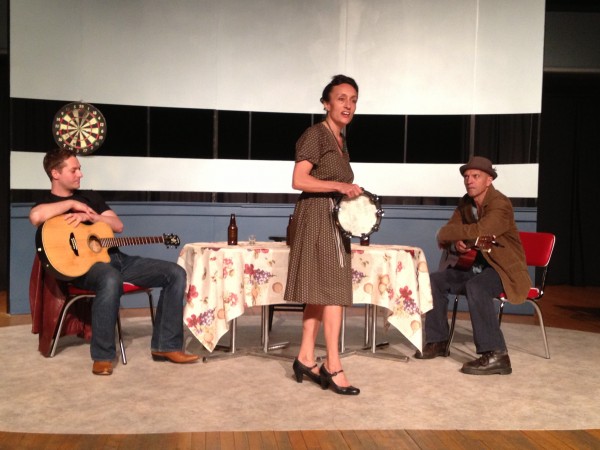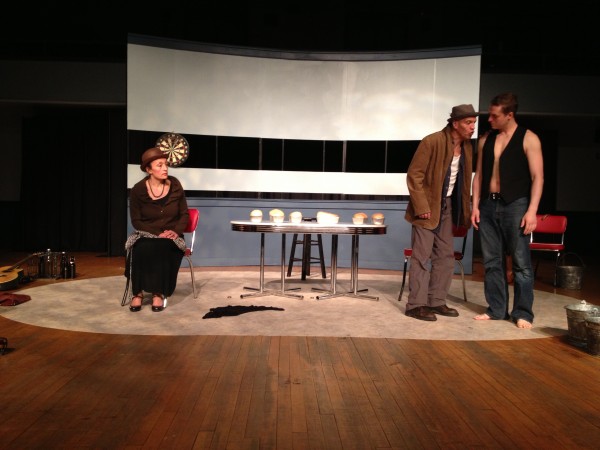
“Gilgamesh: He Who Knew Everything” in performance at Balch Street Theatre
Good theater is the kind where you leave with your mind reeling with ideas about what you’ve just seen – thinking about it and figuring it out. That’s what you have to look forward to if you go to see New World Performance Laboratory’s “Gilgamesh: He Who Knew Everything” at the Balch Street Theatre.
NWPL is a small company. That allows its members (director James Slowiak and actors Debora Totti, Jairo Cuesta and Justin Hale) the chance to experiment with theatrical materials. According to Slowiak, the group spent a few years pondering the ancient Sumerian tale of the epic of Gilgamesh and how to produce it.
L-R:Justin Hale, Debora Totti, Jairo Cuesta, New World Performance Laboratory, “Gilgamesh: He Who Knew Everything.” Photo by Clint Beeler
They figured it out apparently. The source material, the “Epic of Gilgamesh,” is filled with the stuff of mythology – gods and goddesses and the like, along with the story of the heroic deeds and misdeeds of a hero on a quest. Along the way, enlightenment of some kind comes.
In this “Gilgamesh,” the narrative focuses on the human component that is also very much part of the epic. The story is of Gilgamesh (played by Hale) meeting up with Cuesta’ Enkidu (emphasis on the first syllable). They take off on an adventure in life – all the lust (for women and apparently each other), strife (murder and going to war), and fun (boozing it up) that they can gather.
NWPL tells the tale in a clever way – with the actors announcing their real names and whom they are going to play, along with a short introduction of what’s going on. They tell the tale from the basic set – a kitchen table around which they sit as they begin first to tell, and then act out, – the story. The transition is effortless and highly professional.
They also tell the story through song and some narrative and dialogue. The songs come from country western classics and old rock and roll tunes that are turned dramatically for what’s at stake in the scene. As example, my favorite scene in the play is when the goddess Ishtar (Totti) sings “Careless Love” as the men are dabbling in things of the flesh. In her hands, the title becomes almost personified, thereby heightening the gravity of the experience.
The ending concerns the death of Enkidu, and Gilgamesh’s immense and inconsolable grief over his loss. If these two weren’t carnal lovers (and there’s lots to suggest they were in the tale), they were certainly extremely emotionally and spiritually attached. At Enkidu’s death, Gilgamesh puts a veil over his face, like a bride.
New World Performance Laboratory, “Gilgamesh: He Who Knew Everything.” Photo by Clint Beeler
The whole point of the drama is summed up in the refrain song that reappears over the course of the play, composer Blind Willie Johnson’s “What is the soul of man?” It touches on the sum of human experience – what we try to grasp out of life, like maybe power, love, happiness, kindness or perhaps simple survival – and what that says about us.
New World Performance Laboratory will perform “Gilgamesh: He Who Knew Everything” May 9-11 at 8 p.m. at the Balch Street Theatre, 200 S. Balch St., Akron; 330-867-3299; www.nwplab.com. Tickets are $10.
Recent Content
-
Artsarticle ·
-
Artsarticle ·
-
Artsarticle ·

